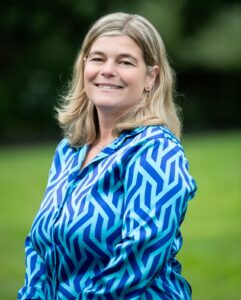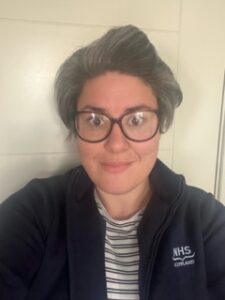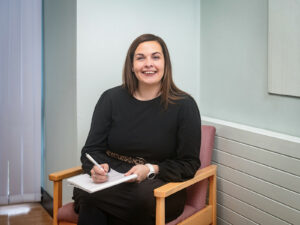 Professional Nurse Lead, Emma Legge recently caught up with Queen’s Nurses’ Jamie McNab and Laura Rothney. Both Jamie and Laura completed the Queen’s Nurse Development Programme in 2022.
Professional Nurse Lead, Emma Legge recently caught up with Queen’s Nurses’ Jamie McNab and Laura Rothney. Both Jamie and Laura completed the Queen’s Nurse Development Programme in 2022.
Now, over a year since they received the title of Queen’s Nurse, Jamie and Laura share how the QNDP has impacted them, their work and in turn, the people that they care for.
Jaime McNab

In her role as the Lead Nurse for Care Homes & Care at Home in NHS Highland, Jaime McNab worked to find ways of improving access and choice in meaningful activities in care homes.
She noticed the huge impact that the pandemic had had on the wellbeing of both her colleagues and the people they were caring for and was keen to address this. Jaime was not afraid to think creatively and courageously:
“I am passionate about encouraging positive risk taking for those in receipt of care, to ensure they can live a fulfilling life.”
During the pandemic, she was shocked to see a high level of social isolation in a communal living arrangement and was determined to do something about it. She also noticed a rise in pressure ulcers, a rise in falls and other impacts of people being in their bedrooms and less active. Initially Jaime had quite a closed idea regarding “activity” and was looking to promote use of a fitness programme. However, throughout the year as she progressed through the Queen’s Nurse programme, her understanding of what was important changed. She began to recognise that meaningful activity is not necessarily “organised” activity but is more about encouraging activity that enables participation in life – be that gardening, setting tables, putting laundry away, sweeping.
“I realised that person-centred care should focus on what the individual wants, not what the health professional thinks is best.”
The Queen’s Nurse programme helped Jaime to tackle this issue, by encouraging her and giving her the confidence to challenge views and by giving her space to reflect and to develop her ideas.
Post-COVID, the impact of social isolation and people not leaving their rooms continued as many residents had lost their confidence and had experienced reduced mobility. Through her project, Jaime worked to ensure that her colleagues were supported and enabled to aid the people they cared for by encouraging and assisting them to be active in a way that suits them.
“We got into a habit historically of activities in care homes being led by a person who does the activities at a set time and a set place, but you or I don’t live like that. An activity for me at home might be sitting down to watch something on the telly and having a chat about it, or equally, I might go to spin class one day. So, for me, the question was, why does activity need to be something different just because you live in a care home.”
For Jaime, seeing three residents sitting outside earlier this year on a sunny day in their hats with their feet in a paddling pool, is the perfect illustration of what meaningful activity should look like.
One size doesn’t fit all, and it is lovely to see residents being active on their own terms.

Image Credit – Iska Birnie, Iska Birnie Photography
Laura Rothney
Laura is a Senior Nurse Practitioner with the Aberdeen city’s integrated drug and alcohol service; she supports nursing teams with the delivery of clinical services. She has undertaken a project to improve access to the drug services, so support is easier to obtain for local communities.
Laura set up a ‘direct access prescribing’ clinic for individuals to access clinical treatment including opiate replacement therapy. This clinic was based within a local third sector drug and alcohol services needle exchange. The aim was to support individuals who were unable to access treatment services through traditional pathways.
Laura’s enthusiasm and drive really shine through and these helped her to push forward her work to find more effective ways to reach service users. Having taken time to understand the issues that were preventing people from attending their appointments, Laura worked in collaboration with other service providers and health professionals to offer a more creative and accessible solution. The result of this person-centred focus was improved access to treatment services.
For Laura, engaging with people and understanding the barriers to them attending appointments and accessing treatment services was key to the success of this project. She spent time gaining feedback and speaking directly to people asking them what factors influence their ability or motivation to attend appointments. Issues around mobility and transport availability, for example someone needing to take two buses so they can’t make an early appointment, were flagged by Laura’s research which were issues Laura was expecting, but there were also other barriers around fear of others knowing where people were going, and associations of certain buildings with alcohol and drug services that she had not appreciated were as influential.
Laura was able to use her research to demonstrate the potential for reaching people and built up a network of support that enabled her to work collaboratively with other health professionals and agencies, including Public Health Scotland, the MAT implementation team and the Scottish Recovery consortium, which provided valuable lived experience.
Initially, Laura as a nurse prescriber, was based in the needle exchange once a week. This enabled conversations to be held with people accessing the exchange about treatment options and debunking some of the myths about treatment and previous experiences of services. Laura recalls that there were a couple of people at the needle exchange who had been trying for months to get into treatment, now able to get the support, which they would otherwise not have accessed.
The Queen’s Nurse Development Programme gave me confidence to drive this project forward despite service pressures. It really helped me in terms of having the confidence that I didn’t need to wait for the service manager or the consultant and that actually I could take this on and do it. Without the programme I don’t think I would have managed to have this piece of work active.